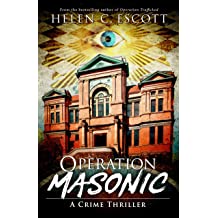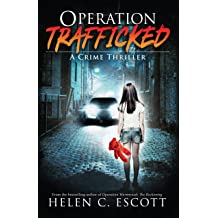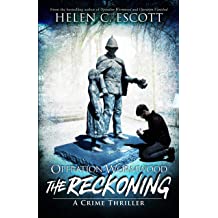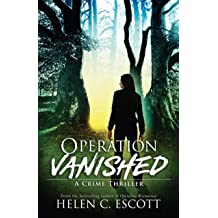A Conversation with Canadian Author, Helen C. Escott
- James D. A. Terry

- Apr 5, 2023
- 6 min read

The gleaming radiance from the full moon lights up the street creating ghostly shadows. The towering hemlock across the street, its branches still laden with cones, stands sentry duty as you step from your front door.
There’s dampness in the air as you climb the three steps to the ancient entryway of the Reading Room. Opening the door you are greeted by the comforting scents of old books, wood polish and freshly brewed coffee.
The ancient wooden floorboards creak and groan with every step as you make your way among the magical journeys, fascinating characters and exciting adventures yet to be experienced patiently waiting on the shelves. The soft glow of a reading lamp and the low murmur of amiable voices let you know you’re nearing your destination. Emerging from between the rows of books you sense the warmth of kindred spirits. You take the only empty chair left in the circle and all of life’s stress seems to simply dissolve.
A hush falls over the room as a well modulated baritone voice begins, Welcome to the Reading Room, my friends. We’re glad you could join our conversation.
Our guest tonight is an award-winning, bestselling Canadian author and playwright. Before becoming an author, she had a ten-year career in radio and TV. In 1998 she joined the Royal Canadian Mounted Police as Senior Communication Strategist. She began writing books full-time in 2014 upon her retirement.
Described as a prolific writer, she has written seven novels and one play. Please join me in welcoming our honoured guest, author, Helen C. Escott.
Thank you kindly my friend for taking the time to talk with us.
James: Helen, you have established yourself as a bestselling Canadian author and playwright; recipient of numerous awards. You’ve been short-listed for the Crime Writers of Canada's best first crime novel award and won the Silver Medal, Best Regional Fiction at the 24th annual Independent Publisher Book Awards. What is the one accolade you have not received but aspire to achieve?
Helen: Thank you so much. That is so kind of you to say. The one accolade I am chasing is having my books picked up by an international publisher and turned into a TV series. I can’t even tell you how many times readers have come up to me and asked: Why isn’t this a TV series or a movie. We have the infrastructure in Newfoundland to do this. So, that is what I hope to achieve at some point. But, first I need a really great literary agent who can make that happen.
James: Wow! That would be incredible, Helen.
What is your greatest fear?
Helen: I don’t have a lot of fears. A career with the RCMP as their Senior Communications Strategist has numbed me to a lot of fears. But I guess I have the same fears as anyone really: Maintaining my health, protecting my children. As an author and crime writer, I spend months researching the crimes in my novels. I spend a lot of time in the underbelly of society. When I wrote Operation Trafficked I began to understand how easy it is for a young girl to be trafficked and moved around. In the Wormwood Duology, I dealt with child abuse and found out it’s not just blooming in communities, it’s rampant. Each book deals with crime and when I research how it operates, it scares me.
James: Although I’m not surprised I am deeply saddened and frustrated to the point of despair at the hopelessness of eradicating such insidious evil as human trafficking and child abuse.
What's the strangest thing you have ever had to research online for your books?
Helen: That would be Operation Masonic. The Freemasons are a fraternal organization – no women allowed! They are also a secretive bunch. As they say – We’re not a secret society but a society with secrets. Their world is absolutely fascinating and everything I write about them in the book is true.
James: Operation Masonic is a remarkable look into the secretive society.
Describe yourself in three words.
Helen: Stubborn, determent, regimented.
James: What do you most value in a friend?
Helen: Loyalty and honour.
James: If you were deserted on an island, which three people would you want to have with you? Why?
Helen: Criteria:
1. One fictional character from your books Inspector Nicholaus Myra. He is my main character and is based on my husband who is a retired police office. Inspector Myra is brilliant but flawed. He struggles with PTSD. He can’t find a balance between work and home life. But he is detailed in how he investigates. He never gives up.
2. One fictional character from any other book
I am a huge Agatha Christie fan and I still read her novels to this day. So, my favourite fictional character is Hercule Poirot. I love the ‘little grey matter’ he used to solve crimes.
3. One famous person that is not a family member or friend
I am not much of a celebrity follower. But I would love to have a conversation with J.K. Rowling about writing and her detective series she writes on the nom de plume Robert Galbraith.
James: What do you do when you’re not writing? What is your favourite hobby?
Helen: I love spending time in the woods, and I hike with my beagle Memphis everyday. I have also been line dancing for years and my husband and I do couples dancing once a week.
James: Learning is an active process. We learn by doing. Only knowledge that is used sticks in our mind. Everything that is past is a learning experience to grow on, a beautiful memory to reflect on or a motivating factor to act on.
What part of Operation Masonic did you find the most challenging to write?
Helen: Getting the right information on Freemasonry was a challenge. You can get a lot of information on line but there is a lot not on line. There is also a lot of misinformation. I consulted with a past grand master who helped me find the information I needed. They would not divulge any secrets but they would tell me ‘yes’ or ‘no.’
James: I’ve watched several documentaries and read many articles on Freemasonry but you revealed several things about the organization that I was unaware of.
What would you say are the characteristics of a perfect murder?
Helen: Crime thriller readers love the story: the arrival of the detective, the final solution arrived at by logical deduction. Crime readers aren’t interested in the identity of the murderer. They crave the pleasure a well-told story with a beginning, middle & end. A Story that takes us into a world in which we know that wrong will be righted, the guilty exposed, the innocent vindicated & human reason will triumph.
James: You make it sound so clear cut and clinical. Do you not think that readers also derive voyeuristic and perhaps competitive enjoyment of trying to solve the crime before the protagonist?
Helen: The characteristics of a perfect murder are that, you never know, truly who the murderer is until the very last chapter. You should never be able to guess. My books are never about the whodunit, they are about the journey. I am taking you on a 300 page trip. You’re going to have to think quick, question everything, including the names of the characters. If you Google the names of my characters, especially in Wormwood and the Reckoning you’ll find another mystery! I like hiding mysteries within mysteries. When someone pays $22 for my book I want them to get their money’s worth.
James: WOW! That’s extraordinary, Helen. I know your readers will definitely appreciate your extra intrigue. I know I do.
Would you and your main character get along?
This is a superfluous question, given your response when asked: What fictional character from your books would you want to be marooned with? You said Inspector Nicholaus Myra your main character is based on my husband.
Helen: Yes. Insp. Myra is a well seasoned investigator. You would not be able to pull the wool over his eyes but you will never be able to tell that he sees through you.
James: What is your writing Kryptonite?
Helen: Travel. I love travel. Every day cruise companies send me emails about their sales. If I open it, I will waste another hour checking the prices of cruises.
James: What is the single question no one ever asks you that you wish someone would ask?
Helen: Why are women so good at writing about murder? The answer: It's because the construction of clues demands a keen eye for the domestic details of everyday life & in this, women excel. A man will say the suspect was wearing a black coat and jeans. A woman will say, the suspect was wearing a black coat from Wal-Mart and Levis jeans.
James: Interesting observation, Helen.
Pick one excerpt from one of your books you would like to share with readers.
Helen: “The killer is always the one who is not getting what they want. Who must have what they can’t have.” (Insp. Myra)
James: What made you choose this particular excerpt?
Helen: It goes to the heart of a criminal and what makes a person a criminal. When someone is not getting what they want how much of their humanity can be stripped away before they stop being human?
James: Very keen insight into human nature, Helen, and a brilliant line by Insp. Myra.
I would like to take this opportunity to thank you and your husband for your service. You put your lives on the line for us and we appreciate it.
Greater Love has no one than this that he lay down his life for his friends. - John 15:13 NIV









Comments